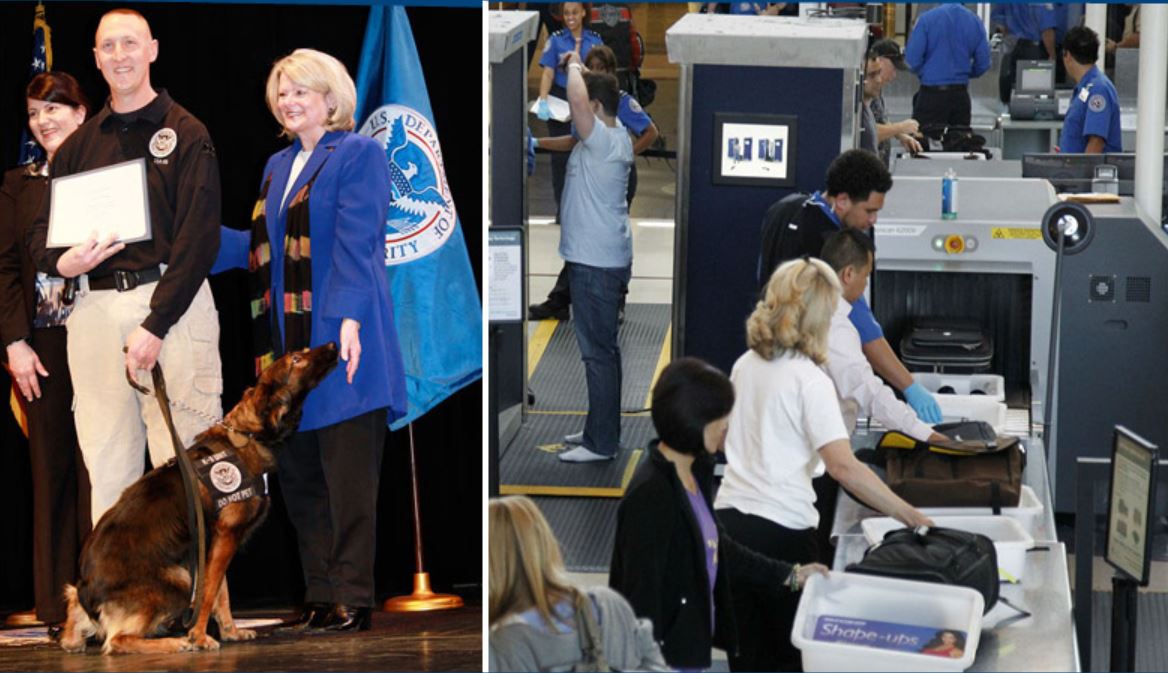Rossides, Who Helped Build TSA in Aftermath of 9/11, Delivers 2018 Blavatt Lecture

Photos from the program of the 2018 Blavatt Lecture of Gale Rossides, former Acting Administrator of the Transportation Security Administration (Photo courtesy of the Blavatt Lecture)
By Kate Delaney, Staff Writer
On Tuesday afternoon, the Eisenhower Institute hosted their final installment of their 2018 Women and Leadership program. Gale Rossides, former acting administrator and one of the original founders of the Transportation Security Administration (TSA), delivered the 19th annual Blavatt Lecture, which is sponsored each year by the Blavatt family including EI Executive Director Jeffrey Blavatt ’88, on her career and experience as a woman who rose through the ranks of the federal bureaucracy to become Deputy Administrator (and Acting Administrator) of the TSA, which she helped create after the terrorist attacks after September 11, 2001.
Rossides opened by stating that her initial career aspiration was to work as an attorney.
“I never set out to have a career in government, but it was an inspiring place to be,” she said.
Influenced by figures like John F. Kennedy, Bobby Kennedy, and Martin Luther King Jr., Rossides decided to pursue a government internship, but was informed early in her career that she wouldn’t get a job in government, as Vietnam War veterans were returning from war and received hiring preference at the time. Instead, Rossides took the only Washington D.C. job she could get—a clerk typist. In this position and those after, Rossides learned, “D.C. is toxic, frustrating, and invasive. [You will always] work in the shadows of giants.”
After being a clerk for several years, where she “learned great humility,” Rossides applied for an internship at the Bureau of Alcohol, Tobacco, Firearms and Explosives (ATF) at the U.S. Department of Treasury. She spent eight years with the ATF, becoming “an expert in human resources, but the law career plans faded.” Instead, she got a Masters in Public Administration, and learned that she “loved leading people and putting teams together.”
But, on February 28th, 1993, Rossides’s career drastically changed. The ATF attempted to raid a ranch in Waco, Texas, suspecting that a religious group was stockpiling illegal weapons there. Many people died in the siege, and the government established new leadership for the ATF. John Magaw was selected new director of the ATF, and “needed someone to put in charge of training, so he chose [Rossides]…He wanted an outsider from the inside.”
At the time, it was rare for women to serve in leadership roles in law enforcement and in government, and Rossides said, “There was huge pushback, but [Magaw] was confident in [my] ability.” After several years and success in this position, another tragic event dramatically changed Rossides’ career once again.
In September of 2001, Rossides and her husband were on vacation in Cape Cod. After seeing planes fly over Massachusetts, their phones started ringing. She was called back to Washington, and Rossides remembers her trip back to the Capitol, when she “flew right alongside the plumes of smoke from the Twin Towers.” After seeing all of the damage from the terrorist attack, she “felt like she had to do something.”
Magaw was selected to lead the formation of a new group in the wake of the attack—the TSA. He asked for her help, and she agreed.
Rossides said, “It took one year to build the agency, develop all of the processes to recruit and screen workers, and create the proper training regimen.”
Before 9/11, Rossides said the airport security process was completely different.
“Four hours of training was the average for airport workers, every checkpoint was staffed differently, and only five percent of checked baggage was screened.”
Rossides and her group had to turn this around in an industry that “had no infrastructure, no policy and procedure, all while Congress, the public, and the media were breathing down [their] back.”
These procedures also had to work in “429 different airports, which all had different processes and structure.”
Still, Rossides and her group operated under the mantra, “never again, not on my watch, and continuous improvement.”
Despite all of the difficulties, Rossides believes that the TSA “has come a long way…In one year, the TSA had achieved their goal of having policies and procedures in place. They hoped to have a high number of workers who stayed on so they would have more experienced, and the TSA has maintained an attrition rate of 15%.”
Not only has the TSA been successful in their original goals but has made some social improvements as well. “The TSA,” Rossides pointed out, “is also one of few federal agencies that must hire women, about 35% of workers must be female.”
To college students, about to enter the workforce, she offered some advice.
“It’s good to have a plan, but don’t let that lead you to miss out on opportunities,” she advised. “The next job doesn’t have to be a promotion, and as a leader, you will always be on stage, so remember your character and integrity. The most important skill is the ability to communicate effectively, and the most important traits are character and a good reputation. You are only as good as your last decision, always think on your feet, trust your gut, take the road less traveled, and surround yourself with people who think differently. Your career is a work of art, and your words and decisions paint the canvas.”
